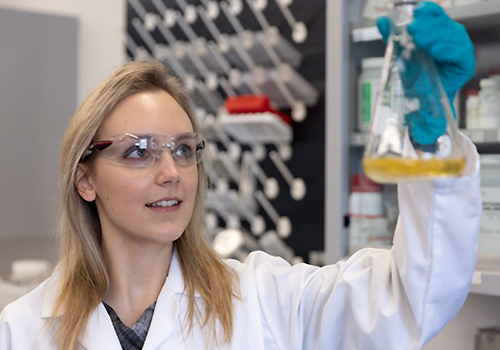Virlana Shchuka has long been fascinated by two questions: how the human body’s cells communicate with one another and how writers express encoded ideas in their novels. The Faculty of Arts & Science enabled her to pursue both passions and explore their connections.
“Whether we’re talking about generating analysis of a cell sample under a microscope or close reading a particular phrase in a prose piece, we’re trying to get at truths about ourselves by hearing and telling stories,” says Shchuka, who majored in cellular and molecular biology as well as in English literature.
“In both the lab and the library, we’re being transported to fantastical, spellbinding new worlds that beckon us to explore them.”
Shchuka earned her honours bachelor of science in 2013 as a member of St. Michael’s College and her PhD in cell biology in 2022.
In part, Shchuka credits undergraduate instructors with instilling an insatiable zest for learning. She most vividly remembers her experiences in two courses: Dr. Kirstin Hainer’s Jane Austen and her Contemporaries, and Professors Jennifer Mitchell’s and Daphne Goring’s Techniques in Cell and Molecular Biology.
"On days when I had either of those classes, I would jump out of bed and rush onto the TTC to make sure I got to campus well in advance of the class start time. I didn’t want to chance missing a single minute of what was going to be taught,” she says.
During her PhD, Shchuka drew inspiration for her thesis topic from her supervisor, Professor Mitchell at the Department of Cell Systems & Biology. Both shared a passion for the same types of research questions and Mitchell recruited Shchuka to take her lab in a bold new direction.
“I was thrilled when Shchuka agreed to pursue her PhD with me,” says Mitchell. “She has always been incredibly driven to succeed, super organized and willing to take risks in her approach to research.
“About halfway through her PhD program I mentioned to her that I was thinking of starting up a new research direction by applying our genomics expertise to the clinical problem of preterm labour. Shchuka was so excited about this innovative approach in the lab that she co-authored the funding application.”

It’s estimated that one in ten births occur before term — Mitchell and Shchuka wanted to understand the “how” behind this. They hope their findings can one day be used to delay preterm labour or even to prevent dangerously early births entirely.
“In our most recent study, we linked two proteins to the control of critical contraction-driving genes,” says Shchuka. “Of course, it’s far too early to talk about potential therapeutic targets, but the more we know about how these proteins operate in a pregnancy context, the better we can understand how labours are timed.”
Maternal health is also a significant research interest in Shchuka’s complementary academic passion, which led to her analysis of women writers’ portrayals of breastfeeding in late 18th-century literature. Her work was published in the 2022 summer issue of Eighteenth-Century Fiction.
In her article, Nursed Under His Own Eye: Co-Nursing Fathers and the Spectacle of Breastfeeding in the British Romantic Period”, Shchuka argues that the era’s authors created literary father figures whose gaze upon the mother as she fed her infant was believed to improve familial health.
"I believe women novelists were trying to write a role for fathers in the act of breastfeeding,” says Shchuka. “Many of their novels point to a unified belief that the right kind of paternal engagement in this act made for stronger emotional bonds between the infant’s parents.”
Shchuka hopes to combine her interests in new pursuits within the health humanities field and has received postdoctoral funding for an exciting project. While she is unable to divulge all the details just yet, she confirms that her work will bring together interdisciplinary discourses on maternal health.
"I wouldn’t have the career opportunities I have today if it weren’t for both the science and literature research experiences I got to have at the University of Toronto.”

